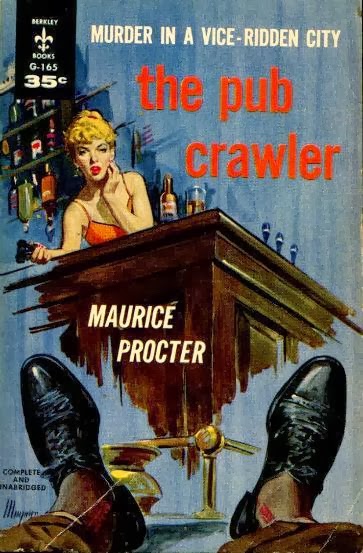 |
| US 1st edition (Harper & Bros., 1957) |
The Pub Crawler (1956) is a perfect example of a police procedural that fails to excite. Though the central conceit of an undercover policeman should provide the reader with ample opportunity for suspense and detection Maurie Procter instead delivers a plodding story that mixes soap opera melodrama with a fairly routine police investigation. Sam Gilmour, owner of the Starving Rascal, is murdered for his rare coin collection and Bill Knight is the rookie policeman chosen by his superiors to be a "pub crawler", apparently police slang for an undercover cop who haunts bars trying to elicit information from the regular customers. Knight's original task was to gather information on illegal gambling but Gilmour's murder offers his superiors the chance to put him on double duty as a "police spy" a term Knight finds more accurate to describe his unwelcome assignment.
 |
| US 1st paperback (Berkeley, 1958) |
But there are the thug characters named McGeen and Frost to keep Knight busy as well. Gunnar is mixed up with these two bookies who may or may not also be involved in the murder of the pub owner. When an attempt is made by McGeen to sell a gold ingot bar to a local junk dealer the police are alerted and the case comes to a startlingly rapid close.
For me there wasn't enough detection in this story to keep interest in the crime plot. The subplot of the women vying for Bill Knight's attention and the repeated beating scenes of the gangster characters kept intruding and distracting me. When Knight is alone and focused on the gathering of evidence -- even if it is a bit unorthodox -- the book approaches true excitement. But these scenes are few and far between. Only when Mrs. Byles is onstage in the soap opera sections does the story hold real interest. Procter's creation of a complex and non-stereotypical working class mother who knows too well that her children are not angels and whose contempt for respectable people fuels her hatred of the upper class kept me reading to the final page. Mrs. Byles was the most complex and unexpected character in a book otherwise filled with rather cardboard, familiar types of 1950s cops-and-robbers melodrama.
The book is far from a classic for any era. I'm dumbfounded how it merits being called one of the fifty best books in a twenty-five year period of crime fiction publishing.
* * *
Reading Challenge update: N2 on the Golden Age Bingo Card - "Book with a Place in the Title"

I only know Procter (you may wish to note the spelling ...) from his "Harry Martinea" series which ran to over a dozen titles in the end. I think I would probably pass on this one too byt the sound of it - love some fo the covers though!
ReplyDeleteOops! Thanks, Sergio for being my proofreader. I've fixed the writer's last name throughout.
DeleteSome proofreader - I managed to leave off the final u from Harry Martineau's name!
DeleteJohn: I've read one Procter book (The Midnight Plumber)--long ago and far away. So long ago that I had little recollection of it. I've picked up a paperback copy (intending to refresh my memory) as well as a hardback version of Two Men in Twenty (I think I got that title right--I would have to go investigate my stacks to be sure). Hmmm. Now I wonder if it will be worth the time?
ReplyDelete